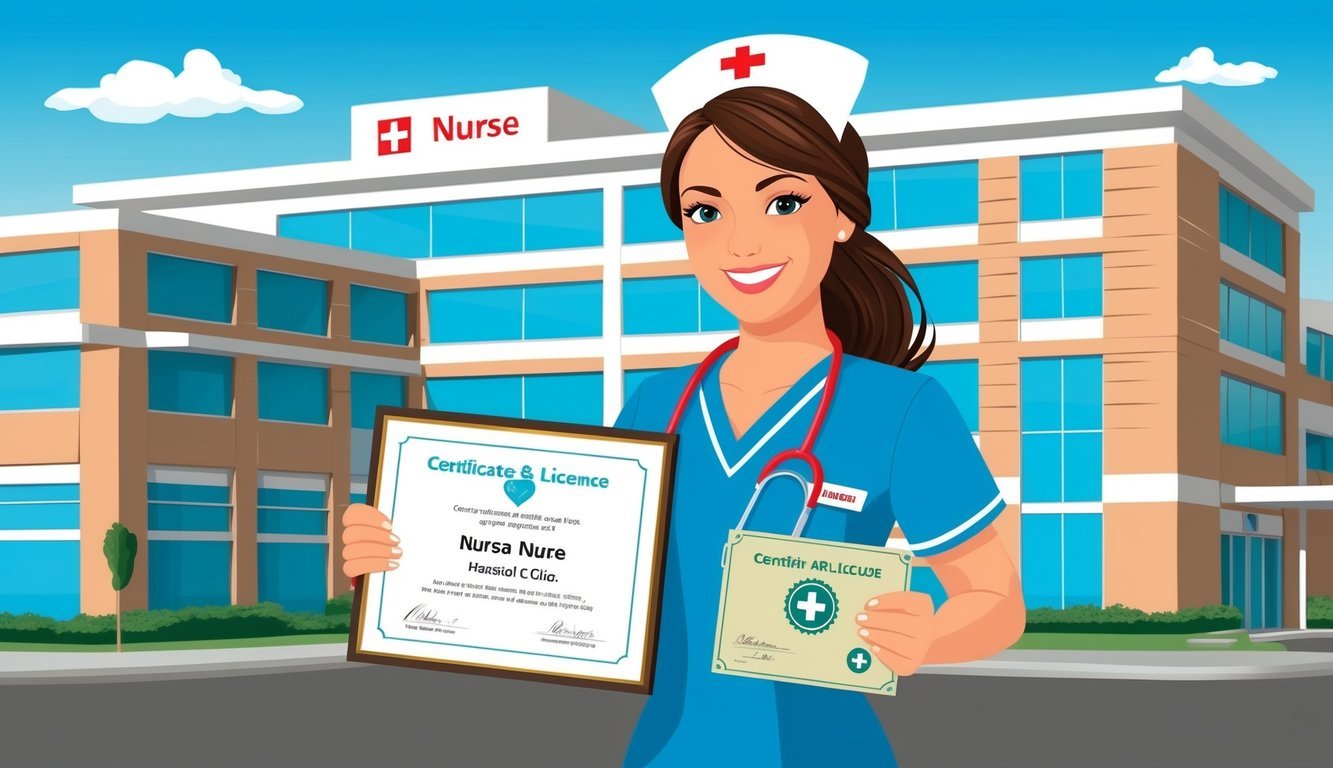If you’re considering a career in healthcare, you may wonder, “What is the most common entry-level job in nursing?” The most common entry-level job in nursing is that of a Certified Nursing Assistant (CNA).
This role is vital in patient care and provides a solid foundation for furthering your nursing education and career.
As you embark on this journey, understanding the various entry-level positions can help you find the right fit for your skills and interests.
Entry-level nursing jobs typically require short training programs and lead to certifications that allow you to start working quickly.
These positions often include Licensed Practical Nurses (LPN) and CNAs, each offering unique experiences and responsibilities within healthcare settings.
By starting your career as an entry-level nurse, you can gain valuable experience and insight into the nursing profession.
The healthcare field is continually growing, and the demand for skilled nurses remains high.
Taking on a role in this sector not only provides immediate job opportunities but also sets the stage for career advancement.
Understanding the different pathways and roles in nursing can guide your decisions as you move forward in this rewarding field.
Key Takeaways
- Entry-level nursing jobs include CNAs and LPNs, providing quick training options.
- Gaining experience in entry-level roles helps prepare you for advanced nursing careers.
- The nursing field offers strong job growth and a range of opportunities.
Overview of Nursing Careers

The nursing profession offers various career paths to suit your interests and goals.
You can start your journey in nursing at different levels.
Here’s a brief overview of some common entry-level nursing positions:
| Position | Description |
|---|---|
| Certified Nursing Assistants (CNAs) | Provide basic patient care and support under the supervision of nursing staff. |
| Licensed Practical Nurses (LPNs) | Provide basic nursing care and work under registered nurses (RNs) or doctors. |
| Registered Nurses (RNs) | Manage patient care and perform more complex medical tasks. Requires additional education. |
As a Certified Nursing Assistant (CNA), you can start working with minimal training.
This role allows you to gain hands-on experience in patient care.
If you pursue a Licensed Practical Nurse (LPN) position, you will complete a practical nursing program.
LPNs have more responsibilities and can assist with medications and treatments.
Registered Nurses (RNs) typically hold an associate or bachelor’s degree in nursing.
RNs play a vital role in healthcare by coordinating care and educating patients.
Each level of nursing has its own requirements and responsibilities.
It’s essential to consider which path aligns with your career goals.
For more detailed information on nursing careers, you can visit Nursing Career Pathways.
Education Pathways in Nursing

Understanding the various educational pathways in nursing is essential for aspiring nurses.
There are different programs and degrees that cater to each career level in this field, providing clear routes to becoming a registered nurse or advancing one’s career.
Nursing Programs
There are several nursing programs available for aspiring nurses, each designed to meet different educational and career goals.
The major types include:
-
Associate Degree in Nursing (ADN): This is typically a two-year program offered at community colleges. It prepares you for entry-level nursing roles and qualifies you to take the NCLEX-RN exam.
-
Bachelor of Science in Nursing (BSN): This four-year degree offers a more comprehensive education. BSN programs often incorporate leadership, research, and public health into the curriculum, providing a broader scope of practice.
-
Master of Science in Nursing (MSN): For those looking to advance their careers, MSN programs typically require a BSN and take two additional years. Specializations include nurse practitioner, nurse educator, and clinical nurse leader.
These programs often provide clinical experience, which is crucial for developing practical skills.
Degrees Required for Nursing
The educational requirements for nursing vary depending on the path you choose.
Below is a breakdown of the degrees:
| Degree Type | Duration | Key Focus |
|---|---|---|
| ADN | 2 years | Entry-level nursing skills |
| BSN | 4 years | Comprehensive nursing education |
| MSN | 2 additional years | Advanced practice and leadership |
Financial aid options are often available to help cover the costs of nursing education.
Scholarships, grants, and loans can assist you in attaining the necessary degrees.
Completing any of these programs will prepare you for the necessary licensure exams and provide the foundation for a successful nursing career.
Entry-Level Nursing Positions
Entry-level nursing positions provide essential roles in healthcare.
They offer a pathway for individuals looking to start a career in nursing and gain valuable experience.
Below are some key entry-level roles in this field.
Certified Nursing Assistant (CNA)
Certified Nursing Assistants (CNAs) play a critical role in patient care.
They assist patients with daily activities like bathing, dressing, and eating.
CNAs are also responsible for monitoring vital signs and reporting any changes to nursing staff.
To become a CNA, you typically need to complete a state-approved training program.
These programs can take a few weeks to a few months.
After completing the training, you must pass a certification exam.
This position is a great way to enter healthcare, as job growth for CNAs is strong.
According to the Bureau of Labor Statistics, the demand for CNAs is expected to grow by 8% from 2020 to 2030.
Licensed Practical Nurse (LPN)
Licensed Practical Nurses (LPNs) have more responsibilities than CNAs.
They provide basic nursing care, administer medications, and assist with medical procedures.
LPNs often work under the supervision of registered nurses.
To become an LPN, you need to complete a practical nursing program, which usually lasts one year.
After that, you must pass the NCLEX-PN exam to earn your license.
LPNs make a vital contribution to healthcare teams, and the job outlook is promising.
The BLS projects that there will be around 60,700 job openings for LPNs each year through 2030.
Registered Nurse (RN)
Registered Nurses (RNs) typically require more education than CNAs and LPNs.
To become an RN, you need either an Associate’s Degree in Nursing (ADN) or a Bachelor of Science in Nursing (BSN).
RNs are responsible for assessing patient needs, developing care plans, and overseeing patient care.
To practice as an RN, you must pass the NCLEX-RN exam.
This position offers a broad range of opportunities, from hospital settings to community health.
Moreover, RNs are in high demand, with over 194,000 annual job openings expected each year through 2030, making it an appealing choice for those entering the nursing field.
Licensure and Certifications

To work in nursing, you need the proper licensure and certifications.
These validate your skills and knowledge, allowing you to provide safe care to patients.
Nursing License
The Registered Nurse (RN) license is essential for practicing as a nurse.
You must pass the NCLEX-RN exam and meet the educational requirements set by your state.
Each state has its own licensing board.
Check your state’s specific requirements for obtaining a nursing license here.
Certified Nursing Assistant (CNA)
If you are starting your nursing career, consider becoming a Certified Nursing Assistant (CNA).
This entry-level position requires shorter training, typically 4-12 weeks.
After completing a training program, you must pass a certification exam.
CNAs provide essential support in healthcare settings, assisting with patient care and basic tasks.
Comparison Table
| Position | Requirements | Certification Process |
|---|---|---|
| RN License | Nursing degree, NCLEX-RN exam | State board approval |
| CNA | CNA training program | Certification exam |
Having the necessary licensure and certifications is crucial for your nursing career.
They ensure you meet the standards expected in the field.
Career Advancement and Job Outlook

The job outlook for nursing is strong.
Registered nurses (RNs) are in high demand.
The U.S. Bureau of Labor Statistics projects a growth of 6% for RNs from 2023 to 2033.
This is faster than the average growth for all occupations.
Entry-Level Positions
As you start your nursing career, consider these entry-level roles:
| Position | Average Salary | Growth Rate |
|---|---|---|
| Licensed Practical Nurse (LPN) | $48,000 | 9% from 2020 to 2030 |
| Nursing Assistant | $30,000 | 8% from 2020 to 2030 |
| Home Health Aide | $29,000 | 33% from 2020 to 2030 |
These jobs often provide valuable experience and help you build skills for future opportunities.
Advancing Your Career
To advance, earning a nursing degree can open doors.
- Associate Degree in Nursing (ADN): This is often required for LPN or RN roles.
- Bachelor of Science in Nursing (BSN): Pursuing a BSN can lead to better job prospects and higher salaries.
Many employers now prefer RNs with a BSN for leadership positions.
You can find more details about career options in nursing at ANA.
Investing in your education and professional development will enhance your career.
Frequently Asked Questions
This section provides detailed answers to common queries about entry-level jobs in nursing.
You will find information on roles, qualifications, salaries, responsibilities, and the nursing hierarchy.
What roles are considered entry-level positions in the nursing field?
Entry-level roles in nursing include Certified Nursing Assistant (CNA), Licensed Practical Nurse (LPN), and Registered Nurse (RN) with an Associate’s Degree in Nursing (ADN).
These positions serve as starting points for many aspiring nurses.
What are the qualifications necessary for an entry-level nursing job?
To secure an entry-level nursing job, you typically need a high school diploma and completion of a nursing program, which may be a diploma, ADN, or LPN certification.
Passing the appropriate licensing exam is also required, such as the NCLEX-PN for LPNs or the NCLEX-RN for RNs.
How do entry-level Registered Nurse salaries compare within the healthcare sector?
Entry-level Registered Nurses earn a competitive salary that varies by location and healthcare facility.
On average, starting salaries can range from $50,000 to $70,000 per year, depending on the state, institution, and additional certifications.
What is the scope of practice for a nurse at the entry-level?
An entry-level nurse must provide basic patient care, assist with daily activities, administer medications, and monitor patient vitals.
The scope of practice may vary based on the state regulations and specific healthcare settings.
Can you describe the typical responsibilities of an entry-level nurse?
Typical responsibilities of an entry-level nurse include:
| Responsibility | Description |
|---|---|
| Patient Care | Assist patients with daily living activities. |
| Medication Administration | Administer prescribed medications safely. |
| Vital Signs Monitoring | Monitor and record vital signs regularly. |
| Documentation | Keep accurate records of patient care. |
| Team Collaboration | Work with healthcare teams for patient needs. |
What is the typical hierarchical structure for positions in the nursing profession?
In nursing, the hierarchical structure usually includes the following positions:
-
Nursing Assistant (CNA): Entry-level care provider.
-
Licensed Practical Nurse (LPN): Provides basic nursing care under supervision.
-
Registered Nurse (RN): Offers comprehensive care and may specialize in areas.
-
Nurse Manager: Oversees nursing staff and operations.
-
Director of Nursing: Responsible for nursing departments in healthcare facilities.
Understanding this structure can help you navigate your career path in nursing.

